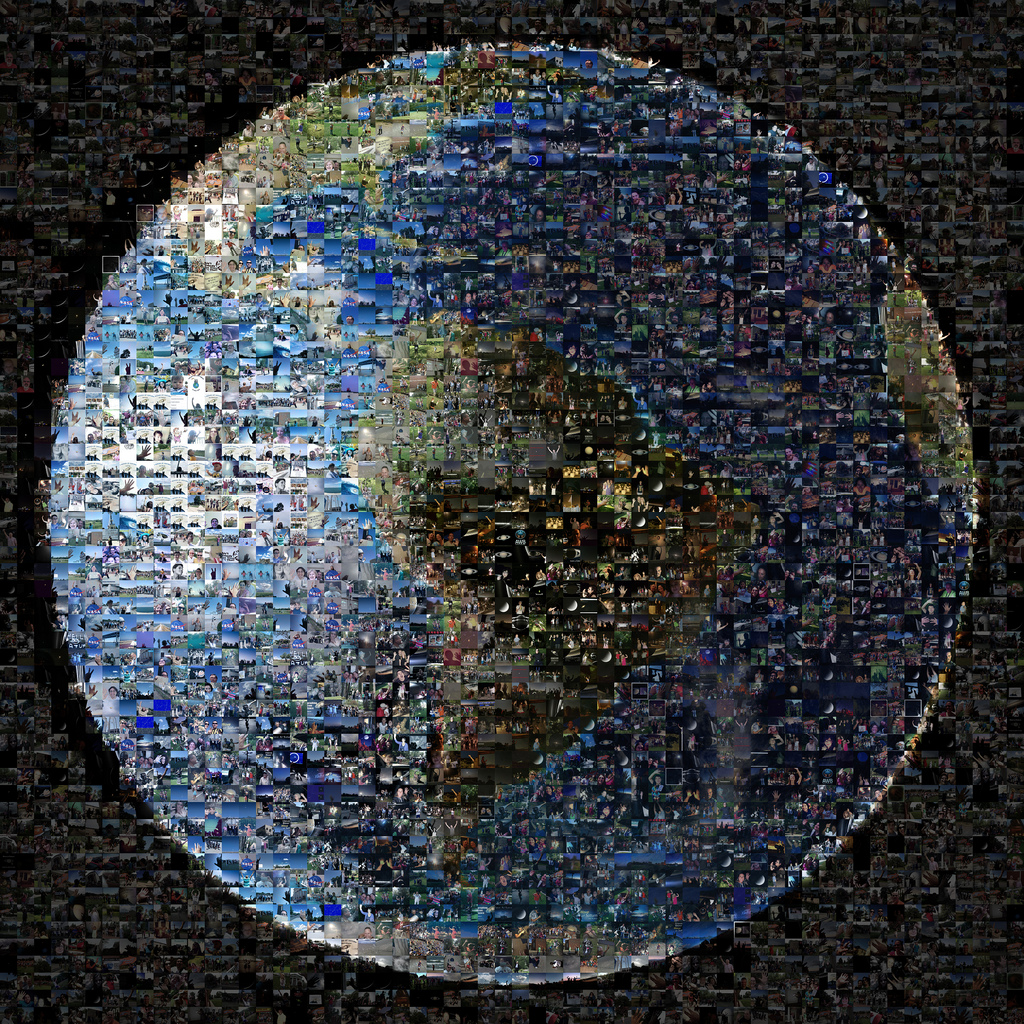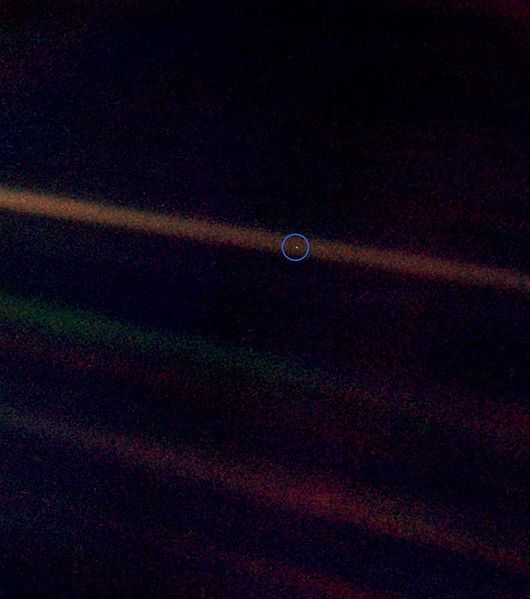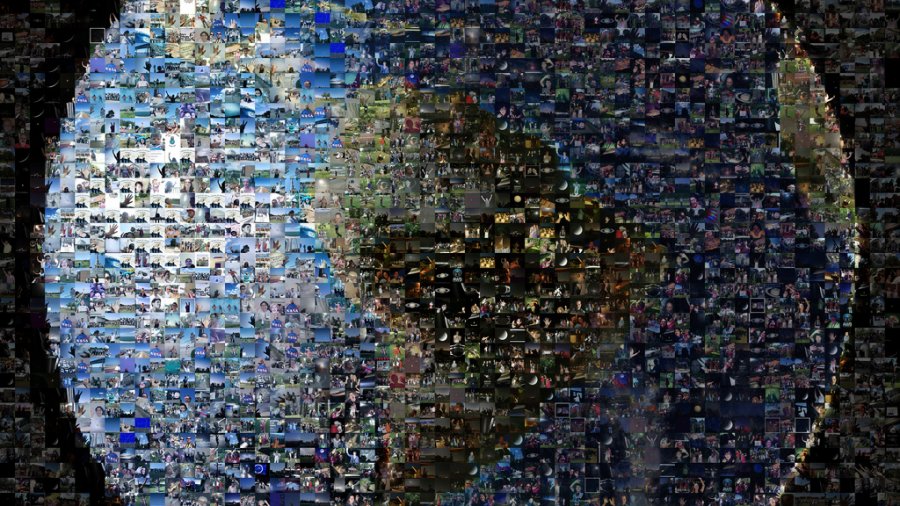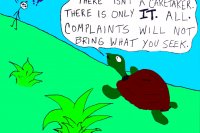If mankind were contacted by an alien race, how would the world react? How would people change?
In his novel, Contact, the late, great astronomer Carl Sagan explores this fascinating question.
I recently had the pleasure of reading Contact, and one of the aspects I most admired about it was Dr. Sagan’s humble suggestion that communication with an alien race would compel mankind to reassess its internal conflicts and prejudices.

Pictures of people around the world assembled into a collage by NASA. Image via NASA Goddard Space Flight Center
Imagining Earth’s Reaction to News of Alien Life
Sagan writes:
“By now, the news of the Message from Vega had reached every nook and cranny of the planet Earth. […] Amidst the sectarian commentary, there was also–all over the world, it was now apparent–a sense of wonder, even of awe. Something transforming, something almost miraculous was happening. The air was full of possibility, a sense of a new beginning.
[…]
There were still political conflicts, some of them–like the continuing South African crisis–serious. But there was also a notable decline in many quarters of the world of jingoist rhetoric and puerile self-congratulatory nationalism. There was a sense of the human species, billions of tiny beings spread over the world, collectively presented with an unprecedented opportunity, or even a grave common danger. To many, it seemed absurd for the contending nation states to continue their deadly quarrels when faced with a nonhuman civilization of vastly greater capabilities.
[…]
For decades after 1945, the world stockpile of strategic nuclear weapons had steadily grown. […] The time came when there were more than 25,000 of them on the planet, ten for every city. […] But finally the world came to its senses. […] the Americans and the Russians undertook to diminish their strategic arsenals down to a thousand nuclear weapons each. […] Britain, France, and China agreed to begin reducing their arsenals once the superpowers had gone below the 3,200 mark. The Hiroshima Accords were signed, to world-wide rejoicing, next to the famous commemorative plaque for the victims in the first city ever obliterated by a nuclear weapon: “Rest in peace, for it shall never happen again.””

Sagan in 1980. Image via Wikimedia Commons
Sagan speculates that an extraterrestrial message would have the effect of revealing to mankind the folly of its divisions against itself. He seems to suggest that our national boundaries, in the face of a situation affecting the entirety of our small, blue world, would appear as little more than arbitrary lines drawn in the sand, reducing our obstinate and ego-driven political conflicts to little more than unreasonable disputes among siblings, and ushering in a newfound spirit of cooperation and peacemaking.
A beautiful proposition, to be sure. The subtextual message to be drawn from this is that we would be wise to reach these realizations on our own, and that sometime (probably in the not-too-distant future) we must. In the face of global climate change and continuing war and conflict in 2013, Sagan’s message remains supremely poignant. Understanding our inherent unity and shared destiny as natives of Earth should not require an event of galactic magnitude. In the coming decades, it will be our responsibility to find in our hearts a Sagan-esque cosmopolitan perspective, if we are to band together and confront the sizable challenges facing our planet.
Later in the novel, Sagan discusses the effect of viewing the Earth from the perspective of one who is orbiting it in space:
“It wasn’t hard to imagine a time when the predominant loyalty would be to this blue world, or even to the cluster of worlds huddling around the nearby yellow dwarf star on which humans, once unaware that every star is a sun, had bestowed the definite article: the Sun. It was only now, when many people were entering space for longer periods and had been afforded a little time for reflection, that the power of the planetary perspective began to be felt. A significant number of these occupants of low Earth orbit, it turned out, were influential down there on Earth.”
The Overview Effect and the “Pale Blue Dot”
One is reminded here of what has been called “the overview effect,” which refers to the profound shift in perspective that is said to be experienced when one views the Earth from space. There is a wonderful documentary, just under 20 minutes long, that shares the life-changing stories of astronauts who have seen the Earth from the outside: watch it here if you’re interested.
Sagan was certainly someone who believed in the transformative power of viewing the Earth from a different vantage point. One of his most famous quotes was made in reference to the image below, dubbed the “Pale Blue Dot” image, which is also the title of Sagan’s book that discusses the image.

“Pale Blue Dot”. Earth as seen from Voyager 1 in 1990. Image via Wikimedia Commons
It seems only fitting to here include Sagan’s eloquent and moving thoughts on the “Pale Blue Dot”:
“Look again at that dot. That’s here. That’s home. That’s us. On it everyone you love, everyone you know, everyone you ever heard of, every human being who ever was, lived out their lives. The aggregate of our joy and suffering, thousands of confident religions, ideologies, and economic doctrines, every hunter and forager, every hero and coward, every creator and destroyer of civilization, every king and peasant, every young couple in love, every mother and father, hopeful child, inventor and explorer, every teacher of morals, every corrupt politician, every “superstar,” every “supreme leader,” every saint and sinner in the history of our species lived there-on a mote of dust suspended in a sunbeam.
The Earth is a very small stage in a vast cosmic arena. Think of the endless cruelties visited by the inhabitants of one corner of this pixel on the scarcely distinguishable inhabitants of some other corner, how frequent their misunderstandings, how eager they are to kill one another, how fervent their hatreds. Think of the rivers of blood spilled by all those generals and emperors so that, in glory and triumph, they could become the momentary masters of a fraction of a dot.
Our posturings, our imagined self-importance, the delusion that we have some privileged position in the Universe, are challenged by this point of pale light. Our planet is a lonely speck in the great enveloping cosmic dark. In our obscurity, in all this vastness, there is no hint that help will come from elsewhere to save us from ourselves.
The Earth is the only world known so far to harbor life. There is nowhere else, at least in the near future, to which our species could migrate. Visit, yes. Settle, not yet. Like it or not, for the moment the Earth is where we make our stand.
It has been said that astronomy is a humbling and character-building experience. There is perhaps no better demonstration of the folly of human conceits than this distant image of our tiny world. To me, it underscores our responsibility to deal more kindly with one another, and to preserve and cherish the pale blue dot, the only home we’ve ever known.”
― Carl Sagan
Carl’s Message is Clear
Carl Sagan’s life was dedicated to the advancement and betterment of our species. Though he is perhaps thought of first as one who spent his life gazing outward, his writings reveal a strong commitment to humanitarian concerns.
His advice to us, like that of so many great teachers and leaders of history, is simple and unmistakable. From beyond the grave, he urges us to band together, to see through our artificial and constructed differences, to embrace one another as equals. He suggests in utter seriousness that the future of our planet and race depend on this transformation of heart and mind.
Sagan left the world a wonderful legacy, and we should honor him by striving to become what he envisioned: compassionate, peaceful, and unified. This begins with each of us. When we practice kindness, acceptance, and non-aggression in our daily lives, we do the work of slowly creating that of which so many have dreamt — a loving and non-violent world.
If you enjoyed this, you may want to check out the ways to receive free updates from Refine The Mind.
Also, one time I made a rap song about Carl Sagan. Listen if you want:
I highly recommend Contact to any Sagan enthusiast or lover of fiction. It is both a thought-provoking and riveting story.
About Jordan Bates
Jordan Bates is a Lover of God, healer, mentor of leaders, writer, and music maker. The best way to keep up with his work is to join nearly 7,000 people who read his Substack newsletter.






Hey Jordan great work doing true journalism to improve our world. Carl Sagan was more than a legend to think so far .Wow.If you need any help ask me.Anything even broadening my mind to change my perspectives on certain things,
Nînäd, thank you for your continuing support. I love your interest in the project and my work. I’ll be sure to reach out to you if there’s something I think you can help me with. I greatly appreciate the offer. Feel free to ask me at any time if there are areas you know you want to learn more about. I can probably direct you toward some reading material.
I watched the film in my teens. Although I can’t recall much of what happened, I do remember being mesmerized by it. It’s funny that it still resonates with me as as a great story emanating warmth.
Having caught myself thinking “That film with aliens was awesome” “I should watch that film with Jodie Foster in it again”… I’m going to take this opportunity to read the book before watching the film again.
Thanks
Zaeem
Absolutely, Zaeem! Great to hear you’ll be reading the book. It’s so worth it. And, yes, a mesmerizing story!
Thanks for commenting! Hope to hear from you again.
Best,
Jordan
Everybody should watch that little Youtube, “The Pale Blue Dot”. Everybody. Sagan has lifted our gaze to the stars. Wonderful, wonderful man.
Absolutely! Thanks for commenting, Francis.
This article has been a staple for mean, and would be hypocritical of me not to thank you for this and all your amazing content. Carl Sagan was one of my fondest heroes that spurred my awakening. More than anyone else in the world, Sagan has influenced my “Why?”and purpose and meaning in my life. He had a unique ability to stir passion within the public over the awe and wonders of science, with his eloquent and humble style. He also wasn’t afraid to spread the truth that science has revealed no matter how much it softened the ego of… Read more »
A comment from Tyler Goetzman was deleted in the shuffle of changing comment systems. Here it is: “This article has been a staple for mean, and would be hypocritical of me not to thank you for this and all your amazing content. Carl Sagan was one of my fondest heroes that spurred my awakening. More than anyone else in the world, Sagan has influenced my “Why?”and purpose and meaning in my life. He had a unique ability to stir passion within the public over the awe and wonders of science, with his eloquent and humble style. He also wasn’t afraid… Read more »
Excellent piece Jordan.
“Contact” (the book) and Carl Sagan inspired me to write about civilization on a blog I call “Our Civilization — The philosophy of an evolved human society”.
We have to work hard to look outside of ourselves (not in the metaphysical sense, but look “bigger” … more towards a Universe-type of view.
I thank you for writing this blog (the whole blog, not just the post).
Thanks for the comment, Joseph. You’re welcome.
Thanks for sharing your work, Greg.
I enjoyed the book and movie “Contact” so much that I decided to write a sequel. I’ve called it “Contact Ascension”. I’ve tried to encapsulate as much of the wonder of Sagan’s universe as possible and yet I recognise that it needed a fresh direction if it was to be worthy of reading. I’ve turned to inner and quantum space in doing this Because of copyright I cannot sell it (no-one will publish), and so I have released it as a free online book on my website. The website is http://reponderance.com If you want to start at the “epigraph” the… Read more »